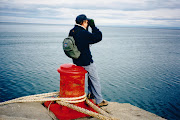 He's unloading huge, rounded river stones from the back of his truck. I ask what he's making. The mason, currently of Fort Bragg, California, lately of San Diego and before that a lifetime pitched in Park City, Utah, where he lay rock, mounded fireplaces and bricked walks for the rich and famous, is building a retaining wall for a bright, white cottage in Mendocino.
He's unloading huge, rounded river stones from the back of his truck. I ask what he's making. The mason, currently of Fort Bragg, California, lately of San Diego and before that a lifetime pitched in Park City, Utah, where he lay rock, mounded fireplaces and bricked walks for the rich and famous, is building a retaining wall for a bright, white cottage in Mendocino.He puts his fingers to his lips; there's a writer inside the house, he explains to me, so we have to keep it low.
"Do you like this kind of work?" I whisper. "It looks . . . heavy."
"Like doesn't come into it. I tell you what, if you want to raise two daughters, you have to work hard, and that's it."
His passion, really, he confides in that low voice, is carving basins and sinks out of pure red stone. He reaches into the front seat of his pick-up and pulls out a binder full of pictures to show me. The smooth, heavy bowls gleam like coral under their cheap overlay of photo plastic. Meanwhile, the Pacific roars and carves all around us.
Except he doesn't have time for such vessels right now, he tells me; right now most of the time he does whatever he can, in this economy.
"It's beautiful work, though."
"Want to see where I'm building the wall?"
We creep to the back of the house, me glancing up at the lace-curtained windows, curious.
Alice Walker?
Then I see the wall.
"What's holding the stones together?"
The river rock, holding back a bed of fresh garden soil, seems to me to be floating, disconnected.
"It's called a dry lay," he says patiently; that's a process in which very little mortar is used, and then most of what little is used gets scraped away--to make it look, from a distance, as if nothing is holding the stones together at all.
"You're almost done?" I ask, feeling the gapped surface.
"No. She's got some other things she wants me to do around here. Fixing other people's shoddy work." He points to the cracked flag of a back stoop.
"You're working pretty constantly?"
"Seven days a week. Need to get this done 'cause I have other jobs waiting."
"And how are your daughters?"
"Just graduated and out of the house."
"You must be proud. Of yourself, I mean."
He shrugs, as if to say, you only do what's expected, and asks me what I'm doing, wandering around the village, so early.
--MD
Photo credit: Bruce Barone





















